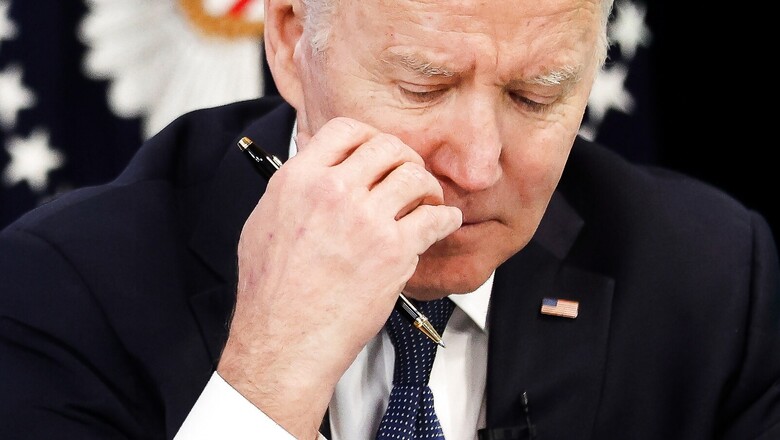
views
How long would the US lecture the world and get away with it? Perhaps not for very long, judging by the straws in the wind. Even the closest of American friends and allies are turning restive at American sanctimony and unilateralism.
“Simply, I do not care … We don’t have the right to lecture you in America … The same goes the other way,” Mohammed Bin Salman, the crown prince of Saudi Arabia, responded when asked whether Biden had misunderstood things about him. Mohammed Bin Salman (MbS) and the crown prince of UAE are in no hurry to take the call of the American President who wants them to pump more oil to prevent a steep rise in petroleum prices, as a result of American sanctions on Russia.
The US has an uncanny ability to jump in and out of one conflict after another, enmeshing both partners and adversaries alike, who are then left to pick up the pieces. Be it Iraq or Afghanistan – remember the US leaders saying that they had not gone in for nation-building? After delivering the hapless Afghani people to the Taliban and turning Nelson’s eye towards the ensuing humanitarian crisis, the Biden administration has now trained its guns on Russia. That Ukraine is being wrecked and innocent civilians getting killed is unavoidable collateral damage for the world’s oldest democracy.
Recently President Biden alluded to the most dreaded eventuality. “… as we provide this support to Ukraine … we will defend every inch of NATO territory … If they move once … granted, if we respond, it is World War III, but we have a sacred obligation on NATO territory… (but) … We will not fight the third World War in Ukraine.” Be careful world what you wish for, you may just get it!
Scripting a Manmade Tragedy
But how was this manmade tragedy in Ukraine scripted? President Biden had called Putin a killer, accused him of interfering in American Presidential elections, and staging cyber-attacks. Then came the carrot in the form of a three-hour long meeting last June in Geneva between the American and Russian Presidents, after which the former remarked that there were “genuine prospects of significant improvement in ties”.
However, the US continued supplying lethal and non-lethal munitions including Javelin anti-tank missiles to Kyiv. In 2021, security assistance worth $450 million was made available. The US also stepped up training of the Ukrainian military by deploying some 150 personnel of the Florida National Guard’s Task Force Gator as also an unspecified number of men from Special Operations Command Europe.
As tensions over Ukraine mounted in January, Biden threatened Russia with grave consequences if it invaded Ukraine, adding a caveat – “It depends on what (Russia) does. It’s one thing if it’s a minor incursion and we end up having to fight about we have to do and not do ….” It was left to the White House aides to soothe Kyiv’s frayed nerves.
After Russia recognised the independence of Donetsk and Luhansk – breakaway enclaves in eastern Ukraine – President Biden promised strong sanctions against Russia but clarified unequivocally that the US would not engage Russia militarily and would only protect the territorial integrity of NATO members. This position has since been reiterated several times. It is meant to assure the American public that the US was not getting drawn into another conflict and also to pre-empt external pressure at a future date. But could this unusual public stand have emboldened Moscow to launch a full-fledged invasion?
As if anticipating that Russia would swallow the bait, the US quickly rolled out the harshest economic sanctions in history, purportedly in coordination with Europe. Putin and Foreign Minister Sergei Lavrov were personally targeted along with other senior political figures. Just when it was needed the most, the planned meeting between Secretary Blinken and Lavrov was scrapped.
A One-sided Narrative?
The West has since not stopped adding fuel to the fire by rushing supplies of all kinds of weaponry including anti-tank and surface-to-air missiles to Ukraine. Efforts are underway to also persuade Poland to transfer its Russian-made fighter aircraft to Kyiv, except that the former is playing hardball. Furthermore, as per unconfirmed reports, American ex-marines (and Chechen fighters on the Russian side) are heading for the conflict zone in large numbers. It does not require much imagination to decipher who is paying the mercenaries? This effectively means American boots on the ground, which is bound to provoke Russia more.
Information warfare is at its peak with the West controlling the narrative and demonising Russia. On March 5, Russia was accused of attacking Zaporizhzhia nuclear power plant in southern Ukraine with missiles. Hardly anyone cared to look at the map or ask what would Russia gain from such a misadventure, as given the physical proximity its own territory and populace would have been subjected to nuclear radiation. It transpired that during the cross firing a shell or two had accidentally fallen some half a kilometre away from the reactor, which was never in danger.
Meanwhile, Ukraine continues to be pounded as the invading Russian forces, mindful of limiting civilian casualties, slowly gain ground. President Zelensky’s gritty resistance is descending into bluster as he persists with needling Putin, terming Russian action as genocide and terrorism and demanding Western military and material support. He has been insisting on the institution of a no-fly zone over Ukraine, which is a ruse to draw NATO into direct confrontation with Russia. He is refusing to see the writing on the wall and appears to be presiding over the decimation of his country. Only time would tell if he would be hailed as ‘David’ or be equated to Nero who kept fiddling as Rome burned.
And then there is the European Union (EU) which has generally deferred to the US instead of standing up for its interests, partly because of its security dependence on Washington. EU and Russia are neighbours; the US is an Ocean away. EU and Russia have interdependencies; the US, particularly its big business, is more concerned about safeguarding its economic interests in China. France, a lead actor in EU and NATO, is unlikely to forget or forgive being blindsided by Biden on the AUKUS deal. Nor can NATO fathom why Biden decided to hasten American exit from Afghanistan without even token consultations.
In the first flush of the conflict, President Biden managed to prevail upon the newly elected German chancellor to put the Nord Stream 2 project in cold storage. However, soon the enormity of the challenge and economic cost of disruption of Russian oil and gas supplies dawned on European majors, forcing them to be selective in replicating American sanctions.
ALSO READ | Russia-Ukraine War: Europe’s Costly Energy Transition Has Accelerated the Great Power Contest
Long-term Impact of Ukraine Crisis
Be it the EU, the Arab world, the ASEAN region, Taiwan, Japan or India, there is more than subterranean anxiety about overdependence on the US as a global leader, prompting a recalibration of geostrategic assumptions. Let me reflect on India-America relations which have galloped from near-estrangement to comprehensive engagement in the preceding two decades. Yet there is a sense of continued tentativeness because of Washington’s reluctance to give due weightage to New Delhi’s geostrategic, security and socio-economic compulsions.
Whether it is terrorism emanating from Pakistan, import of oil from Iran, our long-standing defence cooperation with Russia, interests in Afghanistan or Myanmar, India’s democratic institutions or societal dynamics – the US tends to be prescriptive or judgmental. After every Presidential election, South Block holds its breath till the new White House incumbent reaffirms business as usual with India.
Reverting to the Russian invasion, not surprisingly the American media, which is hard placed to find anything positive about India even in normal times, has been very critical of our stand and so have many Congressmen and members of the strategic community. The official circles have shown some appreciation for India’s predicament due to her critical dependence on Russian military hardware.
In private, there has been measured pressure on India including perhaps during the hastily convened virtual Quad summit on March 3. The possibility of Biden administration imposing CAATSA sanctions on India cannot be ruled out, which would set the ties back and possibly temper India’s interest in Quad.
The Ukraine crisis will have reverberations across the spectrum. Ukraine will rue its decision to part with nuclear weapons in 1994 and trust the solemn commitments of big powers, but for which it would have never met the present fate. North Korea will feel vindicated. Talks with Iran will become more difficult. The global arms race including a quest for weapons for mass destruction would get keener. The Western military-industrial complex will be popping the bubbly; China may decide to test the resolve of a distracted US, by undertaking a misadventure. Global economies will take a hit due to rise in the cost of imports and supply side disruptions.
Swedish Chancellor Count Axel Oxenstierna, in a letter to his son in 1648 wrote, ‘Thou dost not know my son, with how little wisdom the world is governed’. The present crop of world leaders is determined to prove the Chancellor right!
The author is Former Envoy to South Korea and Canada and Official Spokesperson to the Ministry of External Affairs. The views expressed in this article are those of the author and do not represent the stand of this publication.
Read all the Latest Opinion News and Breaking News here



















Comments
0 comment